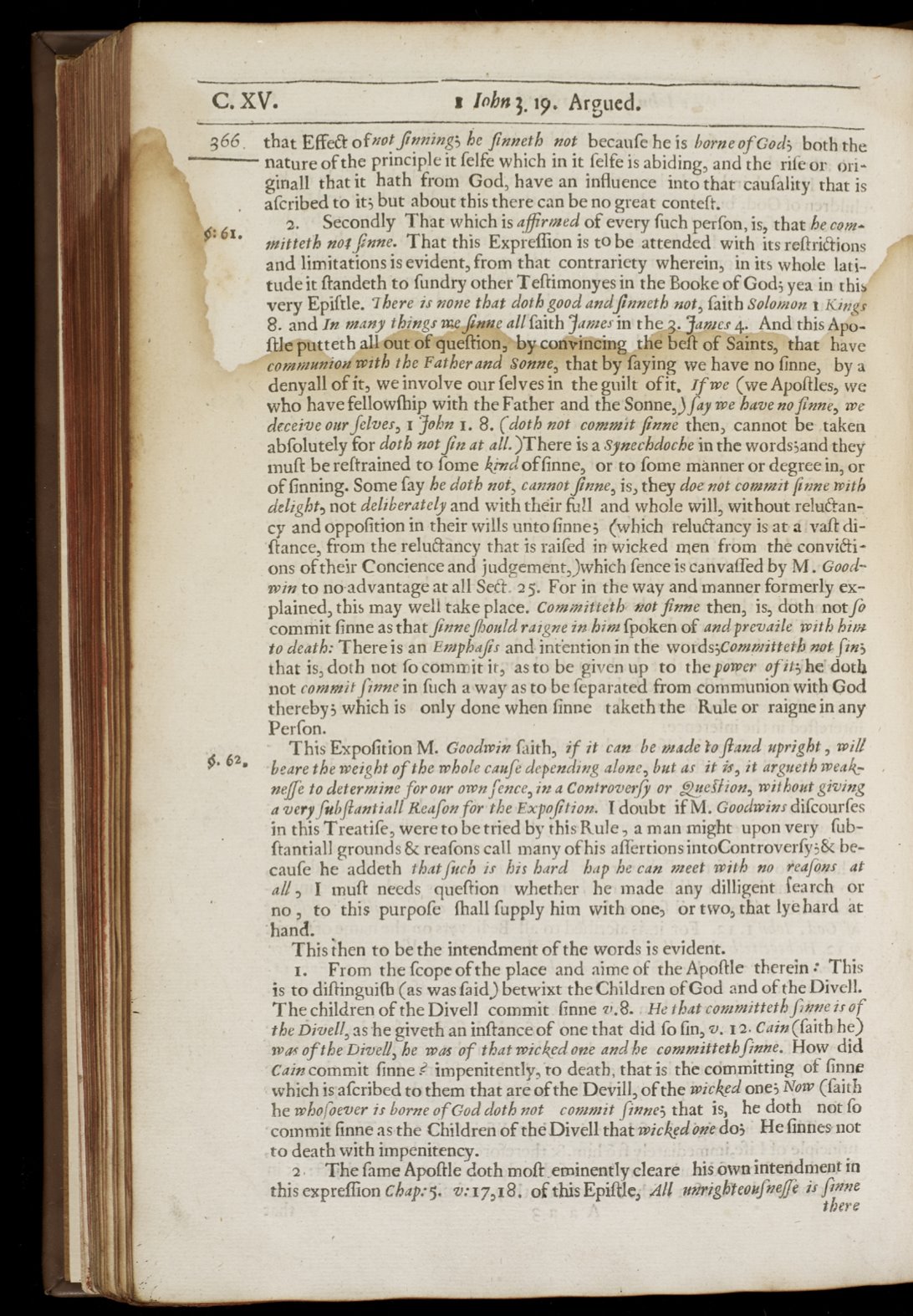

C.
XV.
i
John
3.
tg,
Argued.
366.
that
Effe&
ofnot finning;
he
finneth
not
becaufe he
is borne
of
God5
both the
nature
of
the
principle it
felfe
which in
it
felfe
is
abiding, and the
rife
or
ori-
ginall
that it bath
from
God, have
an influence
into
that
caufality
that
is
afcribed
to it
but about thisthere
can
be
no
great
conteft.
X.61.
2.
Secondly
That
which
is
affirmed
of
every
fuch perfon,
is,
that
he
com-
mitteth
notfinne.
That
this Expreffion
is
to
be
attended
with
its
reftri
&ions
and limitations
is
evident,
from
that
contrariety
wherein,
in
its
whole lati-
tude
it ftandeth
to
fundry
other
Teftimonyes
in
the
Booke
of
God;
yea in this
very
Epiftle.
There
i.r
none
that
cloth
good
and
f
nneth not,
faith
Solomon
I
Kings
8.
and
In
many
things
we
finne allfaith
7ames
in
the
3.3amcs
4.
And this
Apo
-
file
putteth
all
out
of
queftion, by convincing the belt
of
Saints,
that
have
communion
with
the Father and
Sonne,
that
by
Paying
we
have no
finne, by
a
denyall
of
it,
we
involve our
felves in
the
guilt
of
it,
If
we
(we
Apoftles, we
who have
fellowíhip
with the Father and-the Sonne,)
fay
we
have
no
fine,
we
deceive our
felves,
1
john
i.
8.
(cloth not commit
finne
then, cannot be
taken
abfolutely for
doth not
fin
at
all.
)There
is
a
synechdoche
in
the wordssand they
mutt be
reftrained
to
fome kind
offinne, or
to
fome manner
or
degree
in,
or
of
finning. Some
fay
he
cloth
not, cannot
finne,
is,
they
doe
not commit finne with
delight,
not
deliberately
and with
their
full
and whole
will,
without
relu&an-
cy
and oppofition
in
their
wills
unto
thine;
(which relu&ancy
is
at
a vaft
di-
Rance,
from
the
relu&äncy
that
is
railed
in
wicked men from
the convifti-
ons
of
their
Concience and judgement,)which
fence
is
canvaffed by
M.
Good
-
win
to
no-advantage at all
See.
25.
For
in
the
way and manner formerly
ex-
plained,
this may well
take
place.
Committeth. not
finne
then,
is, cloth
not
fo
commit
finne
as
that
(inne
fhould raigne
in
him
fpoken
of
and
prevaile with him
to
death:
There
is
an
Fmphafis
and
intention
in
the
words;Committeth not
fin;
that
is,
doth
not
fo
commit
it,
as
to be given up
to
the
power
ofit;:he
doth
not
commit
finne
in
filch
a
way
as
to
be
feparated
from communion with God
thereby;
which
is
only done when
finne
taketh the Rule
or
raigne in any
Perlon.
6
This
Expofition
M.
Goodwin
faith,
if
it
can
be
made
to
R
will
and
upright,
beare
the
weight
of
the
whole caufe
depending alone, but as
it
h,
it
argueth weak-
neffe
to
determine
for
our own
fence,
in
a Controvert), or
uueflion,
without
giving
a
very
fubftantiall
Keafon
far
the
Expofztion.
I
doubt
if
M.
Goodwin:
difcourfes
in
this
Treatife,
were
to
be tried by
thisRule,
a
man might upon
very
fub-
ftantiall grounds
&
reafons call many
of
his
affertions intoControverfy ;& be-
caufe he
addeth that
filch is
his
hard
hap he can meet
with
no
reafons
at
all
,
I
mutt
needs queftion
whether
he made
any
dilligent fearch
or
no
,
to
this
purpofe
(hall fupply
him
with one, or two, that
lye
hard
at
hand:
This then
to
be the
intendment
of
the
words
is
evident.
s. From
the
fcope
of
the
place and aime
of the
Apoftle
therein : This
is
to
diftingui(b
(as
was Paid)
betwixt
the
Children
of
God and
of
the Divell.
The
children
of
the Divell commit
finne
s'.8...
He
that
committeth
Pine
is
of
theDivell, as'
he giveth
an
inftance
of
one
that
did
fo fin, v.
12. Cain
(faith
he)
was
of
the Divell,
he
was
of
that
wicked
one
and
he
committethf
nne.
How
did
Cain
commit
finne? impenitently,
to
death,
that
is
the committing
of
finne
which
isafcribed
to
them
that
are
of
the
Devil!,
of
the
wicked
one;
Now
(faith
he
who
foever is borne
of
God
doth not commit
finne;
that
is,
he
Both
not
fo
commit
finne
asthe
Children
of
the
Divell
that
wicked
¿inc
do,
He
finnes
not
to
death
with impenitency.
2,
The
fame Apoftle
doth
moft eminently cleare
his
own intendment
in
this
expreffion
Chap:
9:
v
:17,18:
of
thisEpiftle;
.rtll unrighteoufneffe
is
finne
there










